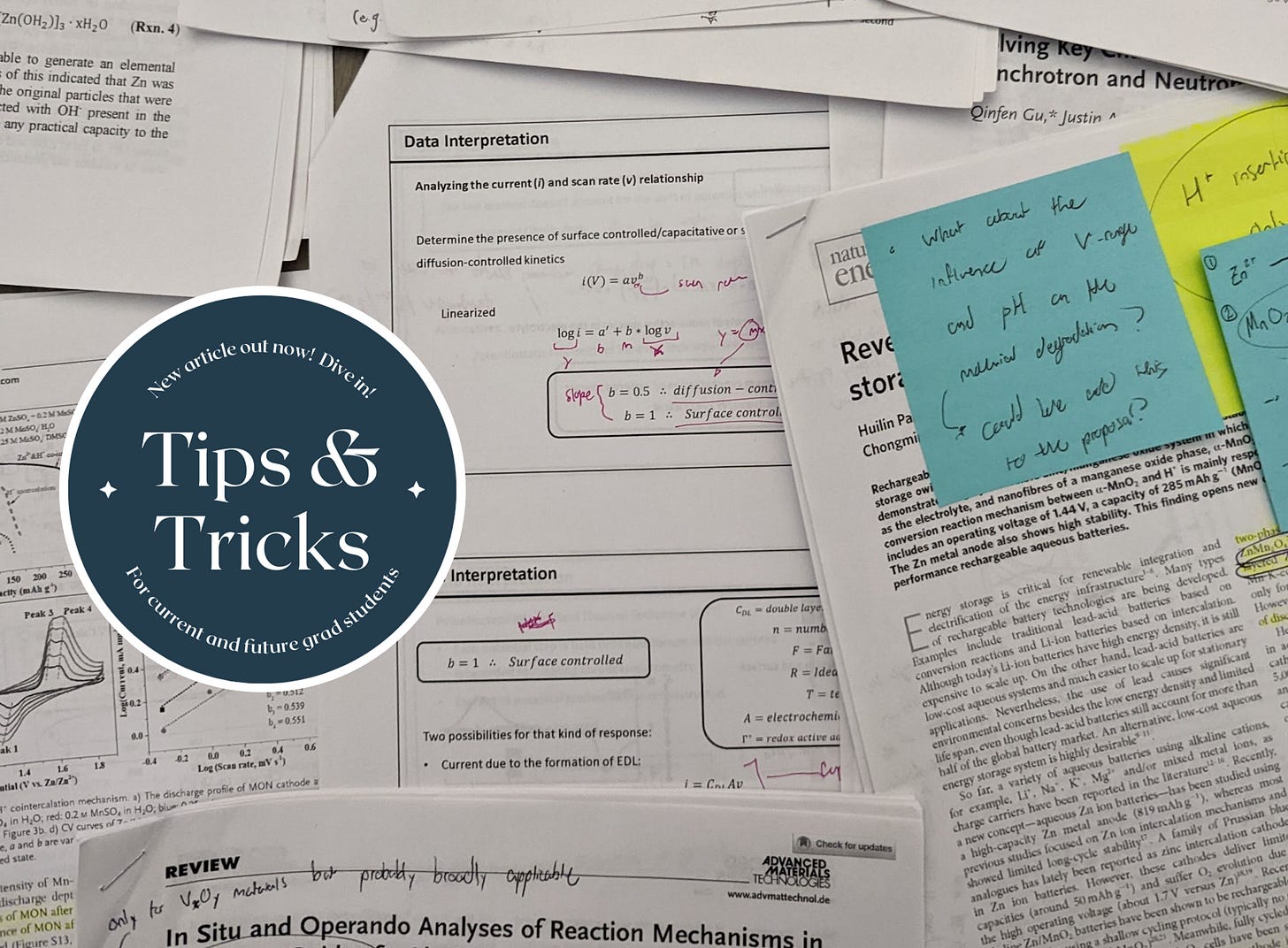How do I get started with my research project?
Episode 1 - Tips for instantly becoming a more efficient and effective reader
Starting a research project is one of the most daunting aspects of grad school. You likely just joined a new team, you moved to a different space - whether that’s a new office, building, university, country, or all the above – and you are expected to become an expert on a topic in just a few years. Brutal. What direction do you take? What should you learn first? How do you get off the ground running with your project? The best way to have a successful start to your project is to give yourself enough time to read. Read more than you think you need to. The learning curve for any graduate degree is steep and dedicating quality time to reading is your key to getting over it.
📘Why is reading so important?
It might seem obvious that reading is important, but at the start of your project it should arguably take precedent over any other aspect of your work. Why?
Context – A deep dive into the literature surrounding your work will give you context to how your project fits into a bigger picture. To help with this, ask yourself “what do I want my work contribute to my field of study?” and “how will my work impact future research efforts?”.
Inspiration – Seeing what others have done in the field will help you draw inspiration for the direction of your project. Learning about what is state-of-the-art in your field and reviewing how it got to that point will be an asset when you start to develop a plan of action.
Understanding – Reading will only lend itself to increasing your knowledge of the subject. At first, you may feel like the more you read the less you know, but that is why it is so important to keep going. Build your understanding of your research from the ground up by reading what others have done.
🧠Strategies to read more critically
Everyone has a different style of reading that works best for them, these are a few tips that I have found to make my reading experience the most efficient.
Don’t highlight everything - Highlighting can give you a false sense of security with your understanding of the material, and can clutter the truly important aspects of the paper. Be selective with what you choose to highlight. Ask yourself if the highlighted text adds to your understanding, is an important value/metric/data point, or is a step you might need to replicate in the future.
Figures/Diagrams - Make use of the margins of your paper with notes and diagrams, don’t be afraid to write out your thoughts. Doing this will make it easier for you to return to the paper and give you context to what you originally thought of a section on the first read. Drawing diagrams can also help with your understanding of the material, giving you more confidence that you did in fact learn something from what you read.
Summarize - Once you finish reading a paper it can be tempting to put it away and be done with it. But it will save you so much time in the future if you spend a few extra minutes summarizing 3-5 key points from the paper and putting them on sticky notes or comments on the front page. That way when you are looking for the one point, value, chemical, or whatever it is that you need, you can have access to it right away instead of searching through the text again.
Schedule - Dedicate time in your schedule to read consistently. Since reading can be an easy task to put off (no deadline), it is more likely for you to do it if you book time to do so.
Ask yourself - Constantly ask yourself questions while you are reading to probe your understanding of the text and determine what is important to you. If you get stuck being unable to answer something, take a moment to think critically about it, ask someone around you, or do a bit of research to answer it for yourself before moving on.
TL;DR - Here is a 30 second video summary if you are running late for your next meeting with your supervisor, or on the way to class, but you still want to soak up this info.
🔍Resources to help you on the research journey
I have included some resources below that are (hopefully) accessible either openly to the public or through your university or college.
Notation software – If you are not the type of person to print out your literature, or you don’t want to waste 500 pages of paper on a textbook, there are plenty of digital notetaking apps that can help you.
GoodNotes ($)
MS OneNote (Free)
Literature databases – Besides your local library or old papers crammed into the desk you adopted, there are many different ways to find academic papers relevant to your research. I have included a few that I use below, but this is not an exhaustive list.
SciFinder ($ - check with your university!)
Scopus ($ - check with your university!)
Google Scholar (Free)
Ask a librarian! This can be daunting for some people, but librarians can help save you time finding a piece of literature.








